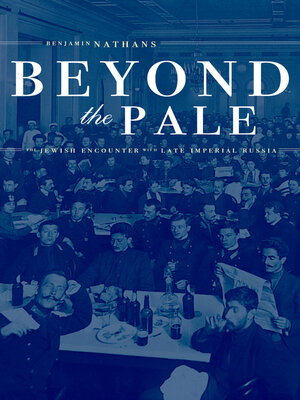Beyond the Pale
ebook ∣ The Jewish Encounter with Late Imperial Russia · Studies on the History of Society and Culture
By Benjamin Nathans

Sign up to save your library
With an OverDrive account, you can save your favorite libraries for at-a-glance information about availability. Find out more about OverDrive accounts.
Find this title in Libby, the library reading app by OverDrive.



Search for a digital library with this title
Title found at these libraries:
| Library Name | Distance |
|---|---|
| Loading... |
A surprising number of Jews lived, literally and figuratively, "beyond the Pale" of Jewish Settlement in tsarist Russia during the half-century before the Revolution of 1917. Thanks to the availability of long-closed Russian archives, along with a wide range of other sources, Benjamin Nathans reinterprets the history of the Russian-Jewish encounter.
In the wake of Russia's "Great Reforms," Nathans writes, a policy of selective integration stimulated social and geographic mobility among the empire's Jews. The reaction that culminated, toward the turn of the century, in ethnic restrictions on admission to universities, the professions, and other institutions of civil society reflected broad anxieties that Russians were being placed at a disadvantage in their own empire. Nathans's conclusions about the effects of selective integration and the Russian-Jewish encounter during this formative period will be of great interest to all students of modern Jewish and modern Russian history.
In the wake of Russia's "Great Reforms," Nathans writes, a policy of selective integration stimulated social and geographic mobility among the empire's Jews. The reaction that culminated, toward the turn of the century, in ethnic restrictions on admission to universities, the professions, and other institutions of civil society reflected broad anxieties that Russians were being placed at a disadvantage in their own empire. Nathans's conclusions about the effects of selective integration and the Russian-Jewish encounter during this formative period will be of great interest to all students of modern Jewish and modern Russian history.







